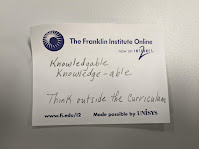Something I think...
Tuesday, June 4, 2024
Monday, May 6, 2024
Relive the past - No, reinvent today for tomorrow.
Seventeen years ago, when I arrived at Ephrata, the library program was recognized as the best in the state. It remains a passion of mine to return the program to that level of impact and performance.
I imagine a program designed to systematically offer a centralized, sequential series of fundamental (core/base) skill sets related to the 4Cs and executive functions that reach each child at a point of need.
What we do now is "not wrong", but it could be better, but there must be a commitment to reconstruct it anew.
More later.
Because the WHY is important - Let's figure out HOW
This post will be filled with items that hung on the wall above my desk. I often posted these as thought stepping stones, adding pieces to a larger puzzle meant to take shape over time.
LIBRARY INSTRUCTION - IMPACT (Written June 2019)
- Systematic instructional development
- Integration of learning (Curricular, Library)
- Learning THROUGH - Assess and reflect within CONTEXT
A curriculum of PROCESS (and Product) - Supporting MASTERY of any content
It can be (and should be) PERSONALIZED in PRACTICE
-I Think- I Create
- I Communicate
- I Collaborate
The curriculum is designed to teach a foundation of skill sets. Some aspects could be offered as stand-alone modules, but the program's true strength would be to embed the skills within coursework over time. These repeat applications under new and evolving circumstances allow students to internalize their thinking and their use.
At the minimum, all students have a shared foundational skill set. Students coming into classrooms would/should have a baseline from which to grow. Content teachers can refine, extend, and customize expectations based on their activities and projects.
I envision a centralized portal (sequence) for skill sets to be introduced or refined throughout a student's educational experience. 
Or better yet, think inside the curriculum? Yes, we do want them to think.
Wednesday, December 13, 2023
In the meantime, I came across the (edWeb) edFocus newsletter featuring a report from Project Tomorrow.












